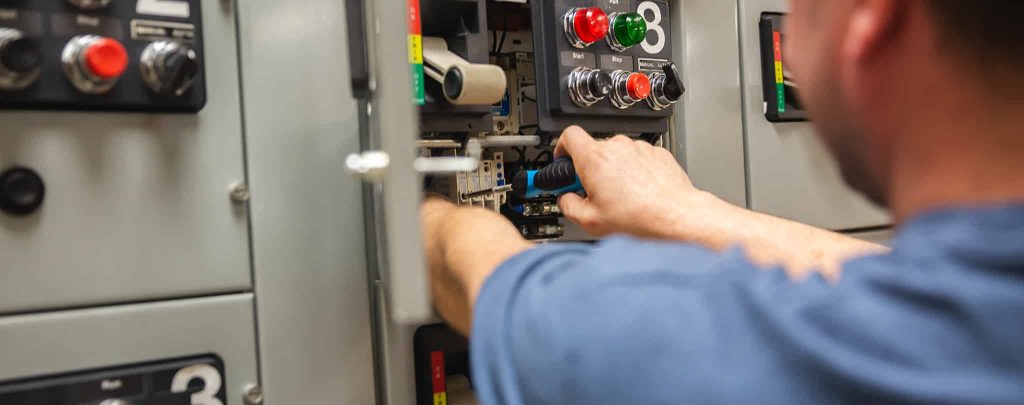Apprenticeship│16 Credits│West Bend Campus
ABC Carpentry Apprenticeship
Receive on-the-job training and master your craft alongside skilled carpenters with the ABC Carpentry Apprenticeship program at Moraine Park Technical College.
Prepare for an active and diverse carpentry career with MPTC’s apprenticeship program. Apprentices gain hands-on classroom instruction and on-the-job training to learn carpentry skills in both indoor and outdoor settings. During the apprenticeship program, participants work alongside journeyman carpenters on residential, commercial and industrial projects.

Apprentices learn the basics of construction safety, how to read blueprints and receive an introduction to green and sustainable energy conservation practices. A carpenter’s work is strenuous and physically demanding. Common tasks include concrete forming and wood and metal framing of structures. Prolonged standing, climbing and squatting are often necessary.
A carpenter’s work is active and sometimes strenuous. Prolonged standing, climbing and squatting are often necessary. Routine uses of safety equipment such as hard hats and safety goggles usually protect carpenters from the hazards of construction sites.
Potential careers include, but are not limited to, the following:
- Building Production Sales
- Cabinet Making
- Commercial Carpenter
- Construction Carpentry
- Estimator
- Furniture Maker
- Instructor
- Pile Driver
- Remodeler
- Residential Carpenter
- Retail Sales
- Supervisor
Apprentice students do not complete standard admissions with Moraine Park. Interested students should contact:
Cheyenne Foster
Apprenticeship Manager – ABC of WI
5330 Wall St.
Madison, WI, 53718
O (608) 244-6056
cfoster@abcwi.org
Application information available at: Associated Builders & Contractors, 800-829-9926 or 608-244-6056; e-mail info@abcwi.org. Start the application process online at https://buildyourcareerwi.org/
- Apprenticeship application
- Employer application (if sponsored)
- EEOC Supplemental Information Form
- High school verification:
- Transcripts with graduation date listed, or
- Copy of high school diploma, or
- GED/HSED certificate, or
- Graduating senior: verification that you are on track to graduate, or
- Homeschool PI – 1206 form verification for each year completed
- Copy of driver’s license or letter verifying transportation means to get to work and school
- Test results (Accuplacer or TABE)
- ACCUPLACER tests are given at Moraine Park testing centers. Call (920-924-3207 or 1-800-472-4554) for ACCUPLACER test appointment scheduling. Testing is available at Beaver Dam, Fond du Lac or the West Bend campus.
- Algebra verification
Tuition Costs
The cost of your degree depends on a number of factors such as total credits required, textbooks and the financial aid you receive. Some programs have additional costs such as uniforms, technology and equipment.
Please refer to the Tuition & Fee Information for enrollment fee information.
Additional Program Costs
Tools and Equipment: Carpenters may need to purchase such tools as a hammer, rule, framing square, hand saw and other hand tools. Construction companies usually provide the necessary power tools.
Cost of Attendance
Cost of attendance (sometimes referred to as the “sticker price”) is the maximum amount of money it costs to attend college for one year and is used to determine your financial aid offering.
While attending Moraine Park during the 2023-24 school year, your estimated cost of attendance for one full year includes tuition of $4,375 (15 credits for fall and spring semester), fees of $338, food and housing of $4,052 (if living with parents, $9614 if living on your own), books and supplies of $2061, personal expenses of $2,245, and transportation of $2007 for a total of $15,161. Your direct costs(those costs paid directly to the college) include tuition & fees. The indirect costs(costs not paid to the college) can vary from individual to individual and your own personal needs.
High school dual credit provides high school students the opportunity to earn college credit while in high school, without leaving their high school classroom. The courses are taught by certified high school instructors using technical college curriculum, grading policies and textbooks.
Has previous life experience already helped you build knowledge and skills applicable to your studies? Applying previously earned credits to a program of study can save you both time spent in the classroom and money spent on tuition and fees.
Transferring here is easy! You can transfer in prior college work by submitting official college transcripts or get a free transcript review.
This program is NOT eligible for financial aid.
Our recruiters on any of the three campuses are ready to help you plan your future!

